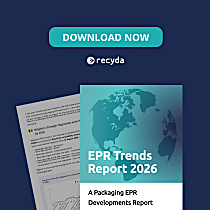Renewable energy rethink: Zero Waste Europe offers guidance on mixed waste sorting amid dispute with FEAD
02 Mar 2023 --- Zero Waste Europe (ZWE) and Reloop have today released a brief guidance on mixed waste sorting (MWS) for the Renewable Energy Directive (RED), which is currently being discussed by European Union (EU) legislators. The guide details how the industry can ensure that only the biodegradable fraction of waste is used for “renewable energy.”
After releasing its MWS benefits report earlier this month, the European Waste Management Association (FEAD) criticized MWS for “undermining years of awareness raising and investments made by the sector to implement and ensure the functionality of source separation of municipal waste by our citizens.”
However, ZWE tells us that it was not suggesting that MWS provide an alternative to source separation.

“Either they [FEAD] failed to read the study or they didn’t understand that the methodology builds MWS on top of separate collections and DRS and not instead as they claim,” Janek Vähk, ZWE’s climate, energy and air pollution programme coordinator, tells PackagingInsights.
 ZWE advocates for MWS in addition to separate waste collections and DRS (Image credit: ZWE).Picking out the plastic
ZWE advocates for MWS in addition to separate waste collections and DRS (Image credit: ZWE).Picking out the plastic
ZWE’s guidelines recommend applying MWS systems of defined quality to remove fossil-derived materials and ensure that only biogenic waste is used for renewable energy generation.
Following the requirement, the operators would either need to pre-sort the waste on-site or demonstrate that all waste received has been sorted before it is delivered for incineration.
“Currently, there is no criteria for mixed waste. Biodegradable waste is burned together with huge quantities of fossil-derived materials such as plastics. The guidance recommends applying MWS of defined quality to remove plastics for recycling purposes,” explains Vähk.
Unhelpful definitions
The RED sets a common framework for promoting energy from renewable sources, including biomass. Since its first version, the directive has included the biodegradable waste fraction.
Vähk asserts that this definition in particular is “counterproductive” as the “biodegradable fraction of mixed waste is never, at incineration plants, combusted without fossil-derived materials present.”
“The definition allows renewable energy support to be made available to a technology that is powered from a substance – mixed waste – which, far from being renewable, EU policy indicates that we should be minimizing,” he says. Vähk says it is “impossible” for renewable energy to be generated through incineration without combusting fossil-derived carbon.
Vähk says it is “impossible” for renewable energy to be generated through incineration without combusting fossil-derived carbon.
MWS for carbon reduction
Vähk also notes that the proposed revision to the RED (Article 3) is “weakly worded.” It states that no support for renewable energy generation should be given to the incineration of waste “if the separate collection obligations laid down in Directive 2008/98/EC have not been complied with.”
“The qualifier is disappointing, not least given the weakness of the implied threshold and given that plastics seem not to be so well captured through separate collections.”
It remains “impossible” for “renewable energy” to be generated through incineration without simultaneously combusting large quantities of fossil-derived carbon. Requiring MWS would improve that situation, explains Vähk.
FEAD’s criticism
ZWE is also releasing the paper in response to criticisms it received from FEAD and the Confederation of European Waste-to-Energy Plants (CEWEP) to its report on the benefits of MWS earlier this month.
“We regret that FEAD has misunderstood the key messages in the report,” reiterates Vähk.
He continues by listing the assumed conditions under which the research examined MWS:
- DRS is rolled out everywhere and achieves the Single-use Plastics Directive’s targets.
- The recyclability of plastics is improved.
- Two source separation scenarios: 1) No improvement and 2) Crucially, that all EU member states achieve the highest demonstrated separate collection rates for plastics of 75%.
As FEAD notes, there have been years of investment in separate collections and the average EU performance on plastics recycling is still poor.
However, Vähk warns that FEAD is “incorrect” to assume that fractions from mixed waste are “highly and irreversibly contaminated.” Plastics and metals may have higher amounts of moisture than organic material but this does not prevent recycling, he argues, but perhaps it does require further investment into better plastic wash plants.
More cost-efficient measures?
Meanwhile, FEAD also argues that there are more cost-efficient measures than MWS that could be delivered.
“However, it is not clear what these are. Driving very high collection rates through separate collections, if achievable at all, are likely to be expensive as well,” says Vähk.
“Decarbonizing incineration emissions through carbon capture is likely to be more expensive and does not help keep resources in a circular economy.”
By Natalie Schwertheim






.jpg)





